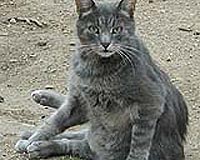 |
Brussels (AFP) June 30, 2009 A genetically modified strain of maize, banned in some EU countries, poses no risk to health or the environment, the European Food Safety Authority declared Tuesday. The move will once again pit the European Commission, which supports use of the maize, against the member states, most of whom do not. The Monsanto MON810 maize "is as safe as its conventional counterpart with respect to potential effects on human and animal health", the independent risk assessor said after studying the strain. The European Food Safety Authority's (EFSA) GMO panel decided that "the molecular characterisation of the DNA insert" into the maize, which gives it its special insect-repellant quality, "does not raise any safety concern, and that sufficient evidence for the stability of the genetic modification was provided". In April, Germany became the sixth EU nation to ban the genetically-modified maize produced by the US biotech giant. A month earlier EU nations refused to force Austria and Hungary to allow the cultivation of the GMO maize -- super resistant against insects -- defying a call from the European Commission. France, Greece and Luxembourg have also banned cultivation of the GMO maize. The case has upset Washington, which has warned Europe against using environmental issues as an excuse for protectionism amid disputes ranging from biotechnology to greenhouse gas emissions. A European Commission spokeswoman said the EU executive would analyse the new findings and then make a recommendation to the 27 member states. However environmentalists Greenpeace took no time in complaining that EFSA "has buried its head in the sand and ignored scientific evidence" on the negative effects of Monsanto's pesticide-producing GM maize on the environment. The European Commission's "blind reliance on EFSA's flawed opinions is likely to anger member states who feel scientific concerns on GM maize are not being addressed seriously", said Greenpeace EU GMO policy director Marco Contiero. A four-year research project funded by the European Commission, the so-called Co-Extra report, declared early this month that genetically-engineered crops and conventional crops would have to be grown in segregated areas to meet environmental concerns about transgenic farming in Europe. Given that fields in Europe are relatively small, and winds can spread pollen from transgenic crops over large distances, co-existence of novel and traditional crops will only be possible if they are grown in "dedicated zones", it said. Genetically-modified crops have a gene, or genes, inserted into them in the lab so that they acquire traits that are useful to farmers. They are widely grown in North America, South America and China. But in Europe they have run into fierce resistance, led by green groups who say the crops carry risk through cross-pollination, potentially creating "super-weeds" that are impervious to herbicides. Only a handful of genetically modified crop have been approved for cultivation in the European Union, but of them only the controversial MON810 maize strain is so far being grown, according to the European Commission. It was approved back in 1998. When EU environment ministers in March refused to force countries to lift their ban on MON810 only Britain, Estonia, Finland, the Netherlands and Sweden supported the EU executive's bid. A source close to the European Commission told AFP at the time of the German ban that it might bring a revision of the European legislation on GM crops. Share This Article With Planet Earth
Related Links Farming Today - Suppliers and Technology
 Shanghai activists save cats from being eaten: state media
Shanghai activists save cats from being eaten: state mediaShanghai (AFP) June 29, 2009 Animal activists in Shanghai rescued 300 cats from a dealer who was planning to sell the allegedly stolen pets to restaurants in southern China, a participant said Monday. The activists, acting on a tip-off from a cat lover, found 22 bamboo cages full of cats in a freight yard, from where they were to be shipped to Guangdong province, Lai Xiaoyu, 34, who was part of Friday night's rescue, to ... read more |
|
| The content herein, unless otherwise known to be public domain, are Copyright 1995-2009 - SpaceDaily. AFP and UPI Wire Stories are copyright Agence France-Presse and United Press International. ESA Portal Reports are copyright European Space Agency. All NASA sourced material is public domain. Additional copyrights may apply in whole or part to other bona fide parties. Advertising does not imply endorsement,agreement or approval of any opinions, statements or information provided by SpaceDaily on any Web page published or hosted by SpaceDaily. Privacy Statement |